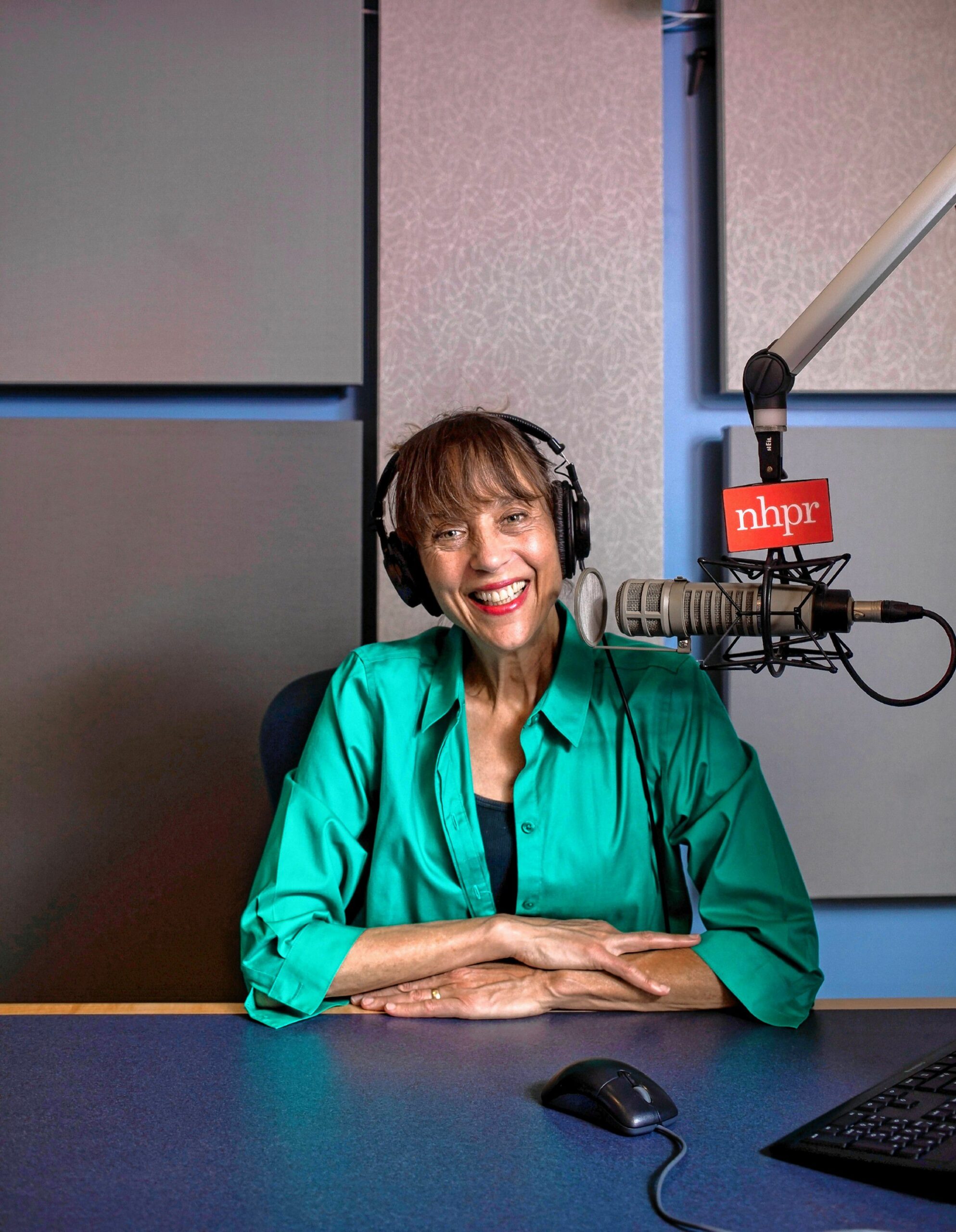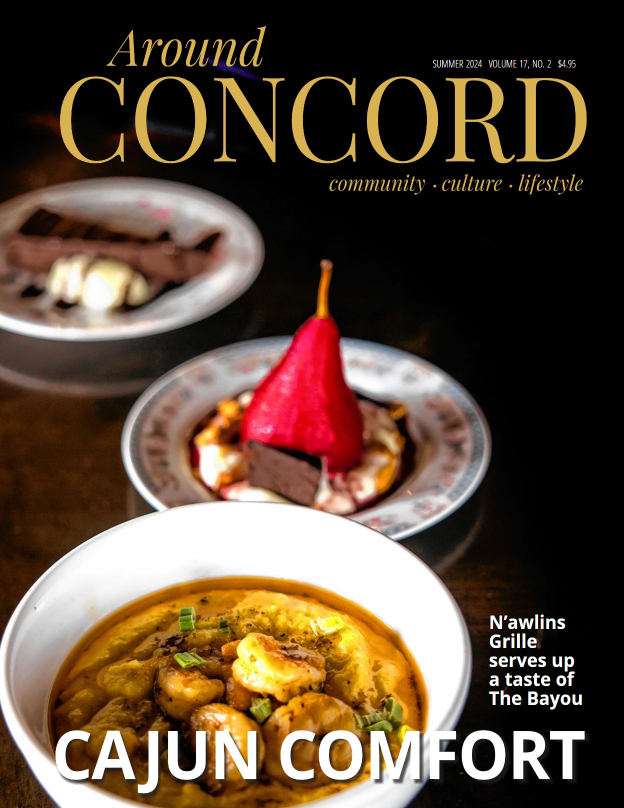Laura Knoy first considered leaving The Exchange in 2020, shortly after wrapping up her election coverage of the New Hampshire primary.
She thought the show’s coverage of the tumultuous election was well-received and leaving at the 25-year mark would be a nice, round number to end on. Then, the pandemic struck.
Listeners who relied on Knoy’s pointed questions and the calming cadence of her voice to guide them through the largest issues facing the Granite State turned to her for assurance and guidance.
“I thought, well, ‘I’m not going to leave now,’” she said. “I mean, I just couldn’t do that.”
She traded her studio for a small room on the second floor of her Concord home, where family photos, inspirational quotes and post-it notes paper the walls. After a year of pandemic coverage, Knoy was planning to host her final episode of The Exchange on June 10, a full 26 years after the show began in 1995.
Knoy has operated at a breakneck pace for decades, often waking before the sun rises to put the final touches on her script, scour the internet for that day’s most important headlines, and meet with her team before she goes live at 9 a.m.
By the time the show wraps up at 10 a.m., she is already working on the next day’s show, and the show after that, and the show after that.
This routine has carried her through coverage of seven presidential elections, devastating local natural disasters, seven N.H. governors, national tragedies like 9/11 and school shootings, and now, a global pandemic.
She said working with constant daily deadlines during the pandemic has been especially difficult and cemented her desire for a slower pace.
“I sometimes feel bad complaining, because I’m not an ER doc trying to resuscitate someone. . . . I’m not helping people down in homeless camps, “she said. “But I think in my job you’re sort of processing people’s trauma. And at the same time, you’re processing your own trauma, because the pandemic has been traumatic for all of us. So, day after day, after day, it’s been hard.”
Knoy is careful to point out that she is not retiring. She’ll continue working with NHPR is some capacity and start focusing on some of her other passions, like writing and hosting community events.
“I’m not old enough and not wealthy enough to retire,” she said. “I just want to see what else I can do.”
Knoy got her start in journalism earlier than most.
It started in elementary school, when she released her rendition of a newspaper that featured interviews from her friends and cat, scratched with pencil on flimsy paper. Around middle school, Knoy made her radio debut on a mock public radio station she called WARP that she and her best friend (who has now also made a career in public broadcasting), recorded on a small cassette player.
Since then, her resume has grown to include roles at WAMU in Washington, D.C., national NPR shows, and USA Today.
During her career, she developed a style of journalism that held the civil exchange of ideas sacred and made exhaustive preparation necessary.
“I come from the over-prepared school of journalism,” she said. “I have notes and I’ve gone over them because in live radio. It’s so easy to make a mistake and it’s just so embarrassing.”
She recalled her first time filling in for the local Morning Edition show in Washington D.C, when she confidently introduced herself as Bill Redlin, the usual host.
“After that, I took little post it notes and I would write ‘WAMU Washington. I’m Laura Knoy’,” she said.
When Mark Handley, the former president of NHPR, courted Knoy for a position at the station, she said she would consider joining if she could host her own show. Her own burst of confidence on her phone call with Handley still baffles Knoy.
“To this day, I don’t know what made me say that,” she said.
Thus, The Exchange was born – a take on talk radio that valued civility and in-depth exploration of statewide issues.
“I really saw that there was a need for a place for a calm and rational discussion of the issues,” Handley said of the genesis of The Exchange before his death.
While the show’s mission has remained the same over the last 25 years, much of New Hampshire has changed. Politicians are more robotic, political parties use more divisive language and people are less willing to listen to each other, Knoy said.
“I do think people are just a lot less interested in figuring things out and more interested in just fighting,” she said.
In a world that has become increasingly hostile, Knoy has been stubbornly kind.
The belief that differences in opinion should be approached with love is something that has been engrained in her since childhood by her father, a former minister.
Her strategy to combat the changing landscape is, of course, more research. She preempts tired, partisan scripts with carefully thought out questions that force politicians to consider other perspectives.
Her producers frantically research her guests’ claims on air to produce live fact checks on divisive subjects.
“There’s just language that completely dismisses out of hand what the other person might be thinking, and shows an utter and complete lack of curiosity as to why the other person might be thinking that way and how we might come together and solve this,” she said. “We have big, big, big, big, big problems, and we’re just yelling at each other. As a journalist, that’s not interesting.”
Knoy’s favorite memories from The Exchange are not from shows that make national news or interviews with presidential candidates, though she’s had plenty of each.
The memories that stick out to her are calls from Granite Staters that offer a candid window into the community. She recounts a call from a man who left his home in the wake of the 2006 floods that ravaged central New Hampshire.
Live on air, he opened the door to his house for the first time since the flood. Listeners heard his heartbreaking reaction to the damage that rendered his home virtually unlivable.
“You’re just not going to get that in any other sort of format,” she said.
Another one of her favorite shows came after the Boston Red Sox won the World Series in 2004. A stream of calls came in from listeners who were convinced their personal traditions were responsible for the win – a woman who’s boyfriend hadn’t changed his underwear in a month, a man who had eaten Babe Ruth candy bars to kill the Curse of the Bambino, another man who wrote a song about the win and sang it for the NHPR audience.
Knoy’s plan for her final show included ample time for listeners to call in and share their favorite memories from the show and reflect on how it has impacted their lives.
Following the announcement of Knoy’s departure, listeners have found their voice too.
“I’m not one for nostalgia, but I never knew New Hampshire without her,” one listener posted on Facebook. u


 View Print Edition
View Print Edition